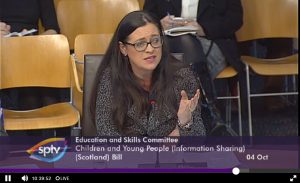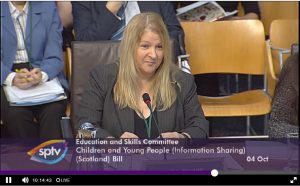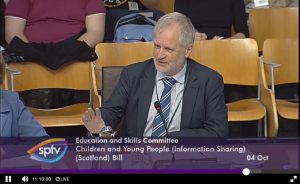Blog
Keeping you up to date on the progress of the Named Person scheme and the NO2NP campaign.
Teachers and data-sharing officials turn up the heat on Named Persons
Posted 8 years agoWorries about teachers’ workload and anxiety around Named Person liabilities were at the forefront of today’s Education and Skills Committee evidence session.
Headteacher and EIS member Lorraine McBride told MSPs that being a headteacher was already a “difficult, difficult job”, and said that adding the Named Person duties “makes everything that bit bigger”. She told the committee that headteachers were worried about being liable if they got it wrong, admitting: “We worry ourselves sick every single day.”
Lisa Finnie of the Scottish Guidance Association, a body which helps teachers involved in the personal support of children and young people, said she felt like they were doing three jobs – teaching, work in the school and the 3am job at home.
She argued that asking them to take on the Named Person role would be an impossible task. She told the committee: “It’s like asking the checkout girl to go and fill the shelves when she’s got a queue. You can’t do it. It’s impossible to ask people to do it”.
Senior officials from the Information Commissioner’s Office (ICO) also gave evidence to the committee today.
Dr Ken Macdonald, ICO’s Head of Regions, told MSPs that the ICO was never totally satisfied with the Named Person Bill. He said the original Bill did not meet the criteria of the Data Protection Act.
When asked if he had informed the Scottish Government that he was not satisfied, he responded by saying the Scottish Government had been copied into emails.
NO2NPers will recall that Dr Macdonald was responsible for the 2013 guidance which gave the green light to Named Person information sharing. He was later forced to withdraw it.
He was also pressed about private emails which emerged after the Named Person Supreme Court ruling in which he expressed his disappointment with the judgment. He did not explain what it was about upholding the fundamental human rights of families that he found so disappointing.
And in another blow for the Scottish Government, Maureen Falconer, ICO’s Scotland Regional Manager, told the committee that the Government’s illustrative code of practice was “not fit for purpose”.
The Education and Skills Committee wrote to Deputy First Minister John Swinney two weeks ago asking for a revised code of practice, but this request was rejected.
Dr Macdonald told MSPs that the code of practice was integral to complying with the Supreme Court ruling and without it the committee would find it difficult to come to a conclusion about whether the revised scheme is adequate.
The Scottish Government’s attempt at fixing the Named Person scheme has received repeated criticism in recent weeks from professionals including lawyers, teachers and social workers, who have been giving evidence to the Education and Skills Committee.
NO2NP spokesman Simon Calvert responded today, saying:
“The Named Person scheme is holed below the water line and rapidly sinking under a tsunami of condemnation from experts and those expected to implement it.
“The Government was humiliated in the UK Supreme Court when judges told them their first proposals were unlawful.
“Now John Swinney’s new Bill, which depends on a code of practice yet to be seen, is floundering badly. The draft code has been attacked on all sides by information watchdogs, teachers, lawyers and health visitors.
“The draft code ‘is not fit for purpose’, according to evidence given to MSPs by Maureen Falconer, the ICO’s Scottish regional manager.
“Yet, Mr Swinney has told MSPs he is refusing to give them sight of a final code before they pass his Bill. This is preposterous arrogance.
“The information watchdogs told MSPs it would be difficult for them to make definitive conclusions about the Bill without seeing the final code.
“Mr Swinney should put up. But perhaps he is too feart in case his proposals are rejected.
“The best alternative is to just rip up the Bill and forget it.”
Yes Mr Swinney, teachers and health visitors are still concerned about Named Person workload
Posted 9 years agoFor several years, teachers and health visitors have raised concerns about the increased workload associated with the Named Person duties.
And those concerns have not gone away.
A look through the notes from John Swinney’s recent ‘three-month period of intense engagement’ reveals yet more riveting findings!
Unite was concerned about “the implications on members’ workload of fulfilling the Named Person role”, something that will be “influenced by any specific requirements and guidance on information sharing”.
And the Education Unions wanted to consider how the Named Person role fits with teachers’ wider workload to ensure that “the Named Person role does not create additional bureaucracy as there is already a lot of paperwork in schools”.
Speaking back in 2015 during a meeting of the Education and Culture Committee, General Secretary of the Association of Headteachers and Deputes in Scotland, Greg Dempster, said: “The biggest issue that I hear mentioned as an absorber of headteacher time is the bureaucracy associated with the named person duties and GIRFEC.”
In the same year the country’s largest teachers’ union, EIS, said that it would have “serious concerns” about any related workload demands during holidays.
An EIS spokeswoman said at the time: “Teachers are becoming increasingly concerned about the demands likely to be made of them which will have implications for workload and potentially for conditions of service.”
If the Scottish Government expects teachers and health visitors to carry out Named Person duties, it really ought to give some answers to allay these concerns… Don’t you think?
NO2NP ACTION DAY: SCOTTISH GOVERNMENT ROADSHOW, ABERDEEN
Posted 9 years agoDeputy First Minister John Swinney told the Education and Skills Committee a few weeks ago that he wasn’t prepared to meet with NO2NP, but would consult only with those who supported the Named Person scheme.
NO2NP supporters asked him to hold public meetings to hear parents’ concerns, but he told them he would not. Instead, his team have taken a leaf out of NO2NP’s book and have held their own roadshow around the country – not about Named Persons, sadly, but about the related issue of education governance.
John Swinney has promised to reduce the administrative burden on teachers, but how will this be achievable when those appointed (without choice) as Named Persons will be responsible for “promoting, supporting and safeguarding” the wellbeing of perhaps hundreds of schoolchildren?
NO2NP supporters have been out at these roadshow events, handing out flyers to delegates to show the contradiction between Mr Swinney’s plans and the reality of what life as a teacher who is a Named Person will be – a bureaucratic nightmare.
Last Thursday, a team of local NO2NP volunteers were out for the morning and teatime meetings at the Aberdeen Exhibition and Conference Centre. As with previous meetings around the country in Dumfries, Glasgow and Perth, a number of people were already aware of the NO2NP campaign and were opposed to the Named Person scheme in general.
Those who took a leaflet readily appreciated the huge amount of administration that would inevitably accompany the role of a Named Person. A Named Person might easily be responsible for 200 or more children and young people, as well as having to be constantly aware of the 222 “risk indicators” to their “wellbeing”.
It’s no surprise Aberdeen City Council Leader Jenny Laing said last year: “The legislation may be putting people off becoming head teachers at primary school, because in this role you are the state guardian for all the pupils at the school. It means you have to take legal responsibility for every child in the school….People don’t want added responsibility.”
Our supporters couldn’t agree more! A special thanks to those who braved the bitter cold last Thursday morning to give educators in the north east yet another reason to say “no to Named Persons”!
Worried by statutory snooping – An anonymous teacher speaks out
Posted 10 years agoI am a Scottish teacher and, in common with many others, my children attend the school where I work. My husband works there too. So, where does that leave us when the Named Person Scheme arrives in our classrooms? Where does that leave our children?

Well. Here is how I understand it will work. Someone in the school (not me, not my husband) will be their Named Person. Perhaps my colleagues in guidance? Maybe the Head Teacher?
But, hang on. That’s my boss. My husband’s boss. How does that work? Please, Head, can I have some time off for medical reasons? Yes. My GP is Dr Smith. Oh, I know you don’t really want to phone her up to find out the extent of my illness. But you have to. It’s the law. Because it ‘may affect the wellbeing’ of my child.
A week off for gynaecological problems? Yes. No problem. I have told my children something bland that won’t worry them. But you think (as I do, secretly) that it might be cancer. Better share that with other people too, and make sure my colleague / boss discusses the implications with my children because I am clearly wrong to seek to protect them. Oh, and while you’re at it – make sure you get a copy of my results from the GP. After all, there is that law to consider.

Thankfully, I am ridiculously healthy – for now. But, oh, another problem. I have an LGBT child, with the worries that come with that. Oh, that’s great! Make that homophobic bigot their Named Person, so glad you can help. Because you see, I know things about my colleagues that might make me less than keen to have them advising my children on these issues. I know about the one receiving treatment for alcoholism; the one who rates sport above all else and thinks books stink; the one who is having complex relationship issues; the bereaved one. They are people I work amongst and share my life with. Will my staff room moans about family life find their way into my children’s files? My colleagues might know Biology, or German or PE, but they are not trained counsellors and so, my vulnerable children, so protected by two loving parents, may be monitored by someone I do not trust.

So, how are the Government going to square the fact that my children’s Named Person is my colleague or my boss? All the while, roaming the corridors and policing the classrooms of the school are not one, but two parents: capable, with degrees, and years of experience working with children, and who have known these particular children from birth.
Why can’t I be their Named Person? I am certainly qualified, more highly than any other human being on the planet, save their father. Why not me?
Named Persons: Here for you – except when they’re not
Posted 10 years agoThe Scottish Government has issued advice to parents and families on the Named Person service including that “Your Named Person is there to help you and your child if you need them.” The ‘GIRFEC Q & A for parents and families’ pushes the idea that Named Persons are the key to making “sure children get the right help at the right time”.
The Named Person, we are told, “will be central to making the system work”. In trying to describe what a Named Person is, the Scottish Government explains that “The Act and supporting guidance sets out a clear set of steps for practitioners to follow to make sure the right information is shared at the right time, so that the right help is offered”.
“A Named Person”, it is explained, “will be available to listen, advise and help a child or young person and their parent(s), provide direct support or help them access other services.” Except of course if the Named Person has finished for the day and gone home – or it happens to be a weekend.
The Association of Scottish Principal Educational Psychologists developed Touchpoint Programmes at the end of 2014. These are “designed to be used by Strategic and Operational Managers tasked with the implementation of the Children and Young People (Scotland) Act 2014” to assist in preparing guidance for practitioners.
This document states that “there is no intention that the Named person service will be available out with working hours”. And yet the rationale persistently put forward for GIRFEC and the Named Person – indeed, the justification for it in the face of increasing opposition – is the potential for early intervention.
Given that the out-of-hours ‘service’ is only designed for “matters requiring urgent attention and action”, which are dealt with through existing Child Protection procedures, the Named Person is apparently not involved in such situations at all.
Recently the Educational Institute of Scotland (EIS), the country’s largest teaching union, came out and said that its members would not fulfil the duties and functions of the Named Person service at weekends or during holidays.
So the Named Person service, even though it is apparently “central to making the system work” is only available within working hours. Detecting those early wellbeing concerns to initiate early intervention will all conveniently be picked up between 9am & 4pm, Monday to Friday.
The right time to access the right help is not decided by the needs of the child but rather the contractual working hours of the Named Person.
Named Persons – there ‘if you need them’ – except of course if it’s before 9am, or after 4pm, or on weekends or half term, Easter Break or Christmas or…
Teachers concerned over demands of Named Persons workload
Posted 11 years agoTeachers, who are due to become Named Persons for their pupils, have voiced concerns about the increased workload the scheme will bring.
Herald Scotland reported a letter it had seen from the Scottish Government asking schools if their “existing on-call arrangements outside term time for senior staff could ensure the ‘continuity’ of the named person service”.
The country’s largest teachers’ union, EIS, said that it would have “serious concerns” about any related workload demands during holidays.
The union, which says it backs the scheme in principle, criticised the lack of clarity over how the scheme would work and said its members were becoming increasingly worried about the extra burden the Named Person role will place on them.
An EIS spokeswoman said: “While we await the publication of final statutory guidance on the role of the named person which comes into effect in August 2016, there is the problem that in schools across the country, different things are being said about how the named person service will operate. Teachers are becoming increasingly concerned about the demands likely to be made of them which will have implications for workload and potentially for conditions of service.
“The level of support the named person will be expected to provide is not yet clear and may vary greatly from case to case. For this reason, the default position should not be assumed that a school should always be expected to provide the named person irrespective of its capacity and resources.”
NO2NP spokesman, Simon Calvert, said: “Teachers have a hard enough time and carry out what can sometimes be a thankless job without adding to their burdens during their well-deserved holidays.”















